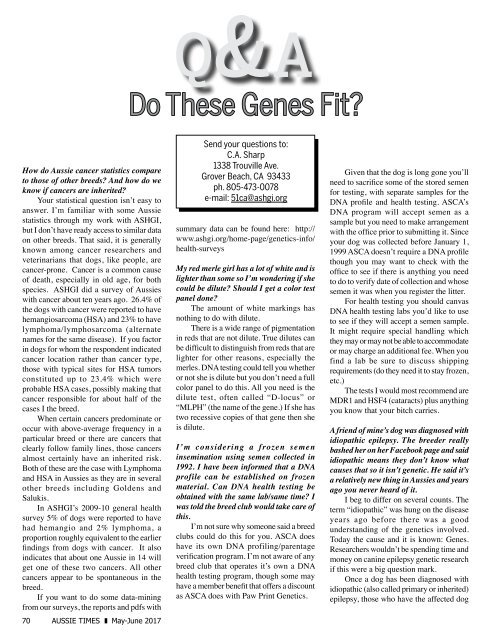You also want an ePaper? Increase the reach of your titles
YUMPU automatically turns print PDFs into web optimized ePapers that Google loves.
Q&A<br />
Do These Genes Fit?<br />
How do Aussie cancer statistics compare<br />
to those of other breeds? And how do we<br />
know if cancers are inherited?<br />
Your statistical question isn’t easy to<br />
answer. I’m familiar with some Aussie<br />
statistics through my work with ASHGI,<br />
but I don’t have ready access to similar data<br />
on other breeds. That said, it is generally<br />
known among cancer researchers and<br />
veterinarians that dogs, like people, are<br />
cancer-prone. Cancer is a common cause<br />
of death, especially in old age, for both<br />
species. ASHGI did a survey of Aussies<br />
with cancer about ten years ago. 26.4% of<br />
the dogs with cancer were reported to have<br />
hemangiosarcoma (HSA) and 23% to have<br />
lymphoma/lymphosarcoma (alternate<br />
names for the same disease). If you factor<br />
in dogs for whom the respondent indicated<br />
cancer location rather than cancer type,<br />
those with typical sites for HSA tumors<br />
constituted up to 23.4% which were<br />
probable HSA cases, possibly making that<br />
cancer responsible for about half of the<br />
cases I the breed.<br />
When certain cancers predominate or<br />
occur with above-average frequency in a<br />
particular breed or there are cancers that<br />
clearly follow family lines, those cancers<br />
almost certainly have an inherited risk.<br />
Both of these are the case with Lymphoma<br />
and HSA in Aussies as they are in several<br />
other breeds including Goldens and<br />
Salukis.<br />
In ASHGI’s 2009-10 general health<br />
survey 5% of dogs were reported to have<br />
had hemangio and 2% lymphoma, a<br />
proportion roughly equivalent to the earlier<br />
findings from dogs with cancer. It also<br />
indicates that about one Aussie in 14 will<br />
get one of these two cancers. All other<br />
cancers appear to be spontaneous in the<br />
breed.<br />
If you want to do some data-mining<br />
from our surveys, the reports and pdfs with<br />
70 AUSSIE TIMES May-June <strong>2017</strong><br />
Send your questions to:<br />
C.A. Sharp<br />
1338 Trouville Ave.<br />
Grover Beach, CA 93433<br />
ph. 805-473-0078<br />
e-mail: 51ca@ashgi.org<br />
summary data can be found here: http://<br />
www.ashgi.org/home-page/genetics-info/<br />
health-surveys<br />
My red merle girl has a lot of white and is<br />
lighter than some so I’m wondering if she<br />
could be dilute? Should I get a color test<br />
panel done?<br />
The amount of white markings has<br />
nothing to do with dilute.<br />
There is a wide range of pigmentation<br />
in reds that are not dilute. True dilutes can<br />
be difficult to distinguish from reds that are<br />
lighter for other reasons, especially the<br />
merles. DNA testing could tell you whether<br />
or not she is dilute but you don’t need a full<br />
color panel to do this. All you need is the<br />
dilute test, often called “D-locus” or<br />
“MLPH” (the name of the gene.) If she has<br />
two recessive copies of that gene then she<br />
is dilute.<br />
I’m considering a frozen semen<br />
insemination using semen collected in<br />
1992. I have been informed that a DNA<br />
profile can be established on frozen<br />
material. Can DNA health testing be<br />
obtained with the same lab/same time? I<br />
was told the breed club would take care of<br />
this.<br />
I’m not sure why someone said a breed<br />
clubs could do this for you. ASCA does<br />
have its own DNA profiling/parentage<br />
verification program. I’m not aware of any<br />
breed club that operates it’s own a DNA<br />
health testing program, though some may<br />
have a member benefit that offers a discount<br />
as ASCA does with Paw Print Genetics.<br />
Given that the dog is long gone you’ll<br />
need to sacrifice some of the stored semen<br />
for testing, with separate samples for the<br />
DNA profile and health testing. ASCA’s<br />
DNA program will accept semen as a<br />
sample but you need to make arrangement<br />
with the office prior to submitting it. Since<br />
your dog was collected before January 1,<br />
1999 ASCA doesn’t require a DNA profile<br />
though you may want to check with the<br />
office to see if there is anything you need<br />
to do to verify date of collection and whose<br />
semen it was when you register the litter.<br />
For health testing you should canvas<br />
DNA health testing labs you’d like to use<br />
to see if they will accept a semen sample.<br />
It might require special handling which<br />
they may or may not be able to accommodate<br />
or may charge an additional fee. When you<br />
find a lab be sure to discuss shipping<br />
requirements (do they need it to stay frozen,<br />
etc.)<br />
The tests I would most recommend are<br />
MDR1 and HSF4 (cataracts) plus anything<br />
you know that your bitch carries.<br />
A friend of mine’s dog was diagnosed with<br />
idiopathic epilepsy. The breeder really<br />
bashed her on her Facebook page and said<br />
idiopathic means they don’t know what<br />
causes that so it isn’t genetic. He said it’s<br />
a relatively new thing in Aussies and years<br />
ago you never heard of it.<br />
I beg to differ on several counts. The<br />
term “idiopathic” was hung on the disease<br />
years ago before there was a good<br />
understanding of the genetics involved.<br />
Today the cause and it is known: Genes.<br />
Researchers wouldn’t be spending time and<br />
money on canine epilepsy genetic research<br />
if this were a big question mark.<br />
Once a dog has been diagnosed with<br />
idiopathic (also called primary or inherited)<br />
epilepsy, those who have the affected dog



